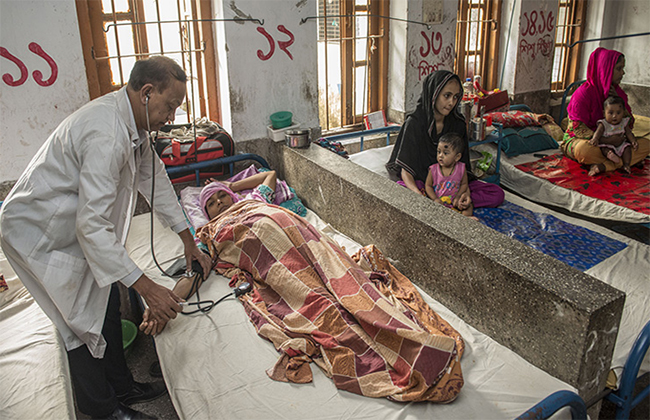
There used to be a program on Bangladesh television called “স্বাস্থ্যই সকল সুখের মূল,” meaning, “Health is the root of all happiness.” As a child I got its literal meaning then but not until middle age could grasp its metaphorical meaning and understand the inseparable relationship between physical and mental health or how one’s wellbeing is interconnected with the other.
Does anyone feel happy when s/he is sick?
One feels miserable when one is physically ill. Similarly, when one is upset, mental stress is reflected on body, manifesting all sort of physical symptoms like headache, neck pain, gas formation and mood irritation, etc. So, enduring mental stress for a longer period will affect our body. We, therefore, need to take care of both our physical and mental health for individual good health as well as collective wellbeing.
Our body is an overly complex machine. Like any machine, our body will work well for a long time if it is taken care of properly and regularly. However, we tend not to care, until there is a problem, or we are diagnosed with a major illness. Instead of being mentally reactive towards health we need to be proactive in caring for ourselves – raising our level of health awareness and making it an essential part of our daily life – just the way we eat, sleep, or brush our teeth.
When health is our priority, we need to consider the possible impact of all decisions on our mental and physical health. Being busy in carrying on countless daily tasks, we forget to focus on ourselves, since there is no shortage of work in our daily lives! And when we do not run around with work checklists, we get busy with social media. As Tagore wrote: Where is the time to waste time?
As social animals, it is only natural for us to socialize and exchange expressions through social media that has brought the world closer, nullifying thousands of miles distance. It has both good and bad impacts which may be discussed another day. My main goal here is to show how to be health conscious, prevent and manage chronic diseases.
As a nurse care manager for the past 15 years in the US healthcare system, I have been creating care plans and teaching patients to manage chronic diseases.
Making a patient care plan requires listening carefully to each patient – even though one may know everything about a patient’s health conditions. At the beginning of my career, I thought I knew best about my patient’s needs. But I soon realized that the care plan should be based on the patient’s needs. Only the patient knows what is most important to him/her. It does not matter whether one agrees or disagrees, or how logical one’s care plan is, it will never succeed if the patient does not want the plan.
Let me share a true story here. Names of all characters in the story were changed to protect the patient’s privacy.
Seventy years old diabetic, Mr. Ramos, was a very jovial and genial gentleman. I was his nurse care manager. When he met me, he always greeted me with a smile and accepted all my advice and teachings without any hesitation.
As mentioned earlier, one of my responsibilities as a care manager is to develop the patient’s care plan. One of the main goals of Mr. Ramos’ care plan was to educate him about diabetes. I met him a few times, taught him about diabetes medications, diet, low and high blood sugar signs, how to measure blood sugar and take insulin. But his diabetes went out of control even after all the education.
I knew something was wrong but could not pinpoint it. After a series of enquiries, it became clear that he was not checking his blood sugar, and not taking insulin, resulting in the rise of his blood-sugar. Why did he do that, I thought.
Mr. Ramos lived alone. His daughter, Marisol, came every morning to take care of him. He also had all supplies and medicines at home, all prescriptions were free of charge. So, the problem did not seem to be financial.
After more enquiries, it was learned that he had borrowed money from a loan shark who was frequenting his house and threatening him for loan repayment. Scared to stay home, he had been hanging outside all day soon after Marisol left. His blood-sugar kept rising since he had not been checking his blood-sugar or taking insulin when needed.
This whole story troubled me. The question of his safety has now been added to the existing concern of out-of-control diabetes.
Marisol was worried when her father’s situation was explained to her. Soon she rented a house in another city and had her father move in with her out of safety concerns.
Relieved of his worries in the new town Mr. Ramos started taking diligent care of his health again and was happy to be with his daughter and grandson. His diabetes was under control within three months, and he did not need Insulin any longer. Mr. Ramos’s life story tells that a care plan will fail if the patient’s greatest need remains unmet while the plan is being executed.
Health is not a standalone concept of life. It is deeply intertwined with our emotional, social, cultural, and environmental conditions. So, we need to understand our obstacles and ways to remove them to care for ourselves. Mr. Ramos’ lack of safety stood in the way of his health. His safety concern took priority over his treatment of the disease. When his problem was removed, he began to take care of his health again. And being with family also improved his mental health.
The first step in solving any problem is to acknowledge the problem. Then, decide whether to solve or live with the problem.
The story may not be fully applicable in Bangladesh’s context. But its main point is – one must identify barriers to good health according to one’s environment and circumstances and then find realistic solutions. Once we learn to deal with obstacles, we can eventually learn to solve problems. We need to proactively remove roadblocks to care for our health and wellness.
In the coming weeks, I will discuss how to set goals, change food habits, select healthy food from food labels before delving into managing chronic disease like diabetes, hypertension, heart disease and more.


